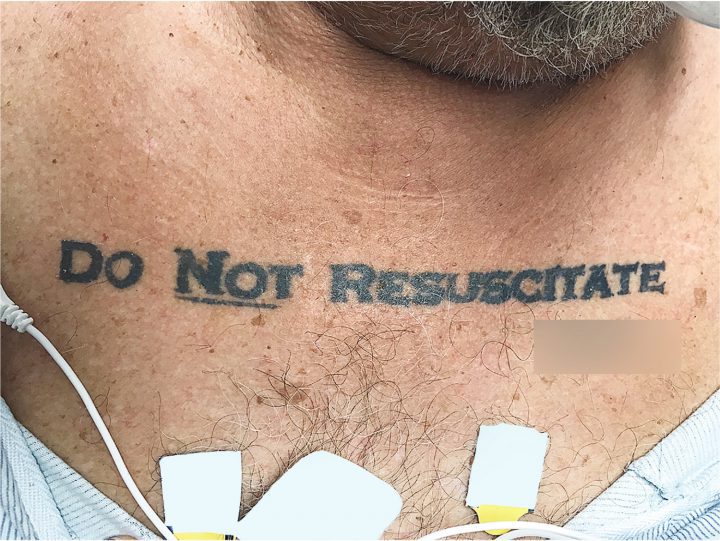Doctors in Florida faced an ethics conundrum when an unresponsive patient was wheeled into the emergency room with a tattoo that read “DO NOT RESUSCITATE” — along with a signature — across his chest.

The unique case, discussed in the New England Journal of Medicine (NEJM) this week, left medical ethics experts unsure about the correct course of action.
READ MORE: Scientists in U.S. are trying to bring dead brains back to life
According to the journal, the 70-year-old man was brought into the hospital with an elevated blood-alcohol level and had several other health problems such as diabetes and lung disease. The report noted that drastic measures were needed to save the unidentified man’s life.
“We initially decided not to honor the tattoo, invoking the principle of not choosing an irreversible path when faced with uncertainty,” the journal reads, adding that doctors didn’t feel right about the decision.
WATCH: Canadians hesitant to perform CPR on strangers

“This decision left us conflicted owing to the patient’s extraordinary effort to make his presumed advance directive known.”

Get weekly health news
The doctors then decided to consult ethics experts, who advised them to honour the tattoo. Eventually, the Florida Department of Health found his real DNR order.
WATCH: Many Canadians not taking life-saving medication due to cost

The patient’s health worsened in the next few hours, and he eventually died without receiving treatment.
But even after his death, medical professionals are continuing to study his case in hopes of learning how to cope with unconventional DNR requests. The Journal notes that while tattoos are permanent — and this one made a clear statement — doctors can’t be sure an unconscious patient doesn’t regret the tattoo.
READ MORE: We’re doing CPR all wrong, Canadian doctor suggests
The Journal concludes by noting that there are still not many answers about how such requests should be treated.
“This patient’s tattooed DNR request produced more confusion than clarity,” it reads.
Bernard Dickens, a University of Toronto professor emeritus who specializes in bioethics, told Global News that how such tattoos are treated depends on individual cases. He explained that several factors need to be taken into account, including how old the person is, what caused the hospital visit, and any pre-existing health conditions.
READ MORE: Patients whose emergency surgeries are delayed have higher risk of dying, study finds
“If it was a sudden, unexpected thing, and an ordinary patient would be resuscitated, then he probably should be,” Dickens said. “If he had a chronic impairment that he knew eventually would be a cause of death, then the so-called directive would have to respected.”
WATCH: What a non-smoking young mom wants Canadians to know about lung cancer

In this case, Dickens said the patient’s lung disease is a sign the tattoo meant he didn’t want to be resuscitated.
While in this case the patient’s family was not accessible, Dickens noted that often loved ones will be able to confirm whether the tattoo reflects the person’s wishes.








Comments
Want to discuss? Please read our Commenting Policy first.